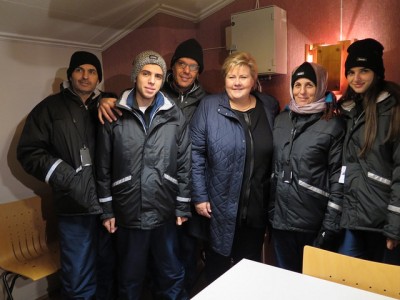Norwegian towns and cities, working with state officials, have found homes for a record number of asylum seekers who have secured refugee status in Norway. Never before have so many refugees been settled, and in every single municipality (kommune) in the country.

“The communities deserve a big ‘thank you’ for their willingness and ability to take in everyone needing a home,” says Geir Barvik, director of Norway’s state directorate for integration and diversity (IMDi). An estimated 16,000 refugees are being settled this year, which Barvik confirmed is a new record.
IMDi has reported that the actual need for refugee resettlement has declined from the estimates early this year, which were based on the record influx of asylum seekers into Norway last year. Around 31,000 people arrived in Norway, the majority from war-torn Syria and Afghanistan, setting off a “refugee crisis” that commanded enormous political attention and immediate emergency measures to provide them with shelter.
Since then, the flow of asylum seekers has abated dramatically and several thousand were deemed as not being in need of protection in Norway. They were sent back, either to their homelands or to the countries where they had entered Europe.
Next major goal: integration
Norway was left with needing to find accommodation for 18,000 refugees this year, a figure that was later reduced to 16,000 in June. The numbers have also been reduced for next year, from 21,000 to around 14,000. Final numbers for refugees needing homes and jobs in 2017 are due to be firmed up in September.
Meanwhile, the need to help refugees start new lives in Norway remains, and Barvik noted that settlement “is just the first step in the process of becoming integrated.” He noted how refugees then need to have their education and work history evaluated, learn to speak and understand Norwegian quickly and get help finding jobs.
“When record numbers of refugees are being resettled, it’s in the cards that lots of attention is paid to integrating them as well,” Barvik said.
The Norwegian government ministries in charge of immigration, integration and equality issues and now both run by ministers from the conservative Progress Party, which traditionally has been favoured restrictions on immigration. They nonetheless have found themselves taking in more refugees than ever before, and getting them settled instead of languishing for years in asylum centers. Now the goal of Immigration Minister Sylvi Listhaug and Equality Minister Solveig Horne is to get refugees into the work force as soon as possible. The Justice Ministry last week sent two new proposals out to hearing that are aimed at doing just that: Asylum seekers who are expected to receive residence permission in Norway, for example, will be allowed to work also before their applications are processed.
Grimstad won integration award
“Getting a job is the key to successful integration,” Listhaug said. “It’s therefore important, both for society and the individual, that asylum seekers likely to remain in Norway quickly get into the workforce.”
Calls are also going out to employers, urging them to more seriously consider hiring asylum seekers. The burden of integration should be shared by both the new immigrant and Norwegians, it’s argued, with the latter needing to accept and employ newcomers.
The city of Grimstad on Norway’s southern coast recently won a prize from IMDi for its efforts to make refugees part of the community. Officials in Grimstad run an introduction program for refugees that makes a point of quickly sending them into the community and local workplaces with cooperating employers to more quickly learn to function in Norwegian. The Grimstad division of state social welfare agency NAV runs the program and has found “language workplaces” for all 150 participants.
The main goal is to help refugees, who’ve had some language classes, to improve their verbal communication with Norwegians. The job placement also helps them meet and work with Norwegians and build a network, and secure permanent employment for those exhibiting willingness and ability. Participants can also swap jobs each of the three to four semesters they’re in the program, to test out different jobs and meet even more new co-workers. Their language training is especially aimed at what type of work they intend to do, and NAV also provides any special clothing or equipment they may need for a specific job.
NAV Grimstad also works with the companies participating in the program, preparing them for the background and skills of those assigned to them and how they can help newcomers converse in Norwegian.
newsinenglish.no/Nina Berglund

